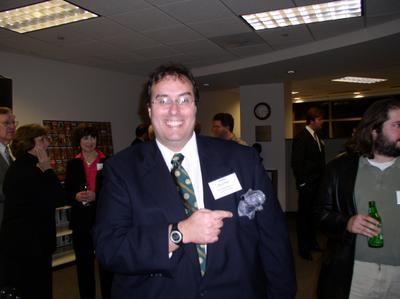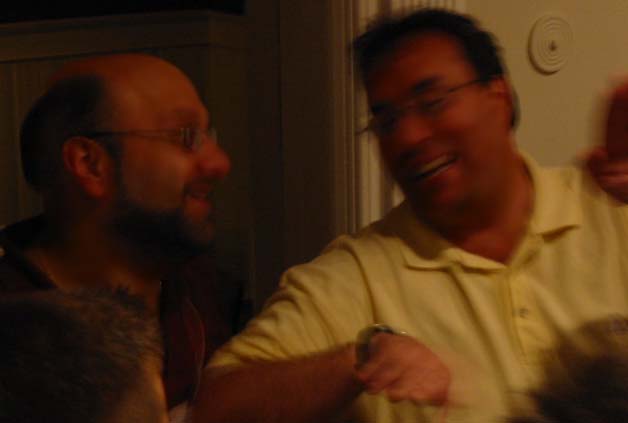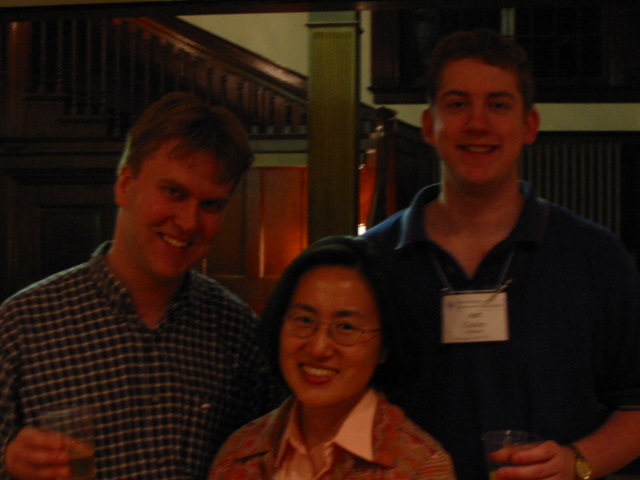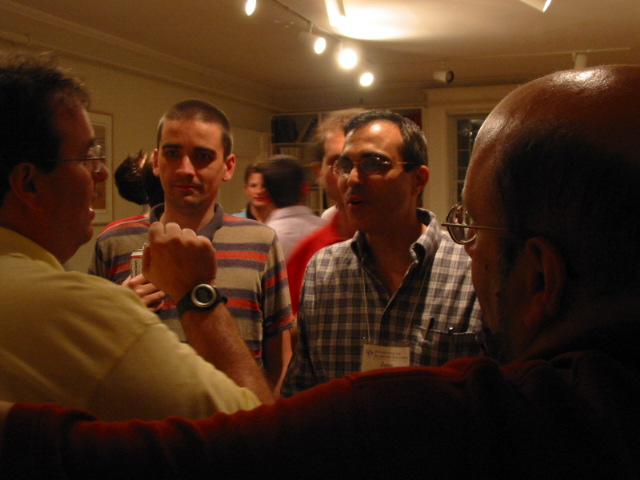WHAT'S
NEW?
[2004] |
December 2003 Those who know me, know that a major part of my life is basketball. I watch literally hundreds of basketball games a year. December is not technically the beginning of the basketball season, that actually starts in October for practices (I coach year round so it actually never starts or stops for me, just different teams) and November for games. But December represents the time of year that it kicks off with earnest, especially the holiday tournaments. My basketball watching isn't limited to the NBA -- though I do subscribe to NBA TV League Pass --- or college basketball (which I love), but also includes high school games. I attend local high school games as well as the various all-star games in the spring. This year my son Stephen and I (he shares my love of the game) went to the Slam Dunk to the Beach high school basketball tournament, which is consider the top tournament in the nation for elite teams and players. This year we saw Dwight Howard, considered the #1 player in the nation, win tournament MVP and his team Southwest Atlanta Christian take 1st place. Other notable players were JR Smith from NJ who is committed to North Carolina to play next year, and Juan Diego Tello Palacios of Our Savoir New American from NY who remains uncommitted on college, but is in the top 20 players nation wide in the senior class was also awesome. Anway it was an unbelievable 2 days of basketball (the tournament goes for over 5 days) and the level of play from all the teams was very high and Stephen and I had a blast watching basketball from 8:30am to 11:00pm for 2 days --- though our butts did hurt from all the sitting in gym bleachers! The third installment of The Lord of the Rings was great. My only criticism of these movies is the treatment of Frodo, who I think is portrayed as weaker than what was intended in the books. Nevertheless, I think that it may well be said of this triology in the future that it is the greatest movie series in our time --- exceeding even The Godfather, and Star Wars. Where The Lord of the Rings triology succeeded, the Matrix must go down as one of the most disappointing. After such a promising start, the second two instalments were without rhyme or reason in terms of plot though the special effects and action of course was spectatular. Shame on the Wachowski brothers for failing to live up to the promise of the first movie. As you can tell, I sort of took a break from economics in December!!!
November 2003 The SDAE/SEA meetings were the best they have been in several years, with many quality papers and new faces. I was particulary impressed by the papers by Bruce Caldwell and Lawrence White related to Hayek's work, there was also a very strong papaer by Paul Lewis and Jochen Runde dealing with social structures and crticial realism (Roger Koppl's comments on this paper were vintage Koppl). Emily Chamlee-Wright's paper on social capital was very good, and her comments on my own paper were outstanding (better than my paper!!!) Steve Horwitz's presidential address to the SDAE was first-rate, and explored in a subtle and persuasive manner the linkages between Mises and Hayek in fundamental price theory. I think Horwitz's paper should go along way to sorting out the mess that has emerged in the efforts to divide these theorists (either by the Misesians or the Hayekians). Horwitz provided as good a reading as I have seen as to why these theorists were complements to one another, not substitutes and that it is the Mises/Hayek research program in economics that we are trying to advance into the 21st century. The Lavoie graduate student session was particularly rewarding. Scott Beaulier's paper not only won in the Lavoie contest for the SDAE, but Scott was picked as one of the top students among all sourthern universities and presented his paper on a panel of those students and did an outstanding job. Gregor Zwirn's paper on methodological individualism versus methodological atomism is a very sophisticated and subtle argument and signals to me that Gregor is an exciting new mind emerging within the Austrian camp and we should all pay close attention to his research. I don't think Scott and Gregor will mind if I say though that Dr. Pauline Dixon stole the show with her passionate and intellectually rigorous presentation of her work on private schooling in India. Pauline is an amazing combination of enthusiasm and intelligence and she is working on an explosively important project --- education among the poorest of the poor. She is a brave soul who has logged significant time in the field in India and Africa and combines detailed field knowledge with strong microeconomic analysis. I think her work with James Tooley is revolutionary and will challenge all our presuppositions about education and economic development. They work at the E G West Centre at the University of Newcastle upon Tyne in the UK.
A great thrill for me at the SDAE/SEA was to see my former student and now colleague Edward Stringham recognized with another award for his research on the self-governing properities of financial markets. Ed won the SDAE Smith Prize for the best paper in Austrian economics for 2003. Ed has established himself quickly as a leading light within the Austrian school and this award simply reinforces the general expectation that Ed is an emerging star within the Austrian camp and the economics profession more generally. Congratulations to Ed for this well-deserved recognition. One of the great things about traveling is the time to read uninterupted. On the plane to and from San Antonio (including a 3 hour delay in Dallas on the way home) I had the opportunity to read the best book written in Austrian economics in a generation -- Bruce Caldwell's Hayek's Challenge (University of Chicago Press, 2003). Caldwell, as to be expected, is a master historian of thought and constructs a narrative of Hayek's evolution of as a thinker that is simply better than any alternative account. And, in the process, Caldwell tells the story of the development of Austrian economics from Menger to today better than I have ever seen. This is a phenomenal work of scholarship and a beautifully written book. The book represents the history of economics as it should be written --- a subtle treatment of economic doctrine, contextualization of the evolution of argument within its broader history of philosophical, political and economic debates, and engagingly written. As far as economics goes, this book is a page turner. It is nothing short of a brilliant. Congratulations to Bruce Caldwell for writing in my opinion the best book in economics for 2003. November 21-23, SDAE/SEA meetings in San Antonio, TX. The 2003 Don Lavoie Memorial Graduate Student paper competition winners have been announced and the winners are Scott Beaulier (George Mason University), Gregor Zwirn (Cambridge University), and Pauline Dixon (University of Newcastle). Congratulations to the winners. There papers are available at the SDAE web-site.
At the Ostrom award ceremony at Mercatus November 7th -- Conference Honoring the Life-time Achievement of Vincent and Elinor Ostrom and the Workshop in Political Theory and Policy Analysis at Indiana University. The Mercatus Center hosted the conference which was sponsored by the Fund for the Study of Spontaneous Orders at the Atlas Economic Research Institute.
October 2003 Update-- The Dallas Federal Reserve Bank conference was a great event and all the papers are now available on-line. I am pleased to report that both Milton and Rose Friedman were in great spirits and very sharp of mind. Highlights of the conference in my opinion were Gary Becker's remark that of all the lessons he learned from Milton Friedman the most important was that economics should not be viewed as a game to be played by clever people, but instead must be viewed as a discipline with the purpose of understanding the real world, and Becker's talk on the importance of competition and his subsequent challenge to Friedman on the government monopoly of money. The papers by Tyler Cowen, Luigi Zingales and Raghuram G. Rajan were particularly insightful. The Dallas Federal Reserve Bank is hosting a conference on The Legacy of Milton and Rose Friedman's Free to Choose. I am presenting a paper at the conference on the impact of Free to Choose in East and Central Europe and the former Soviet Union. I woke up one morning in late September to learn that I had been chosen to be the Hayek Memorial Lecturer at the LSE for 2004. Here is the announcement. Since that time I have been working out the details with the LSE. Here is what I know so far, I will give a large public lecture and then give four smaller seminars for students. I am to stay at the LSE for 1 month and will be housed at STICERD (a research center at the LSE under the direction of Tim Besley). I am most likely going to spend October 2004 at the LSE.
September 2003 At the end of September I traveled to the University of Toronto where I presented a joint paper with Peter Leeson and Christopher Coyne entitled "Man as Machine: The Plight of 20th Century Economics." This paper was published earlier this summer by the Japanese Society for History of Economic Thought. In Toronto I discussed not just this paper, but a broader research project attempting to measure the changing trends in economics scholarship based on the framework laid out in the paper with Leeson and Coyne. In particular, I am looking for good ways to measure the style and substance of contributions to economics in the top journals from 1950 to 2000. Christopher Coyne also traveled to Canada at the end of September to present our paper on entrepreneurship at a conference at St. Mary's College in Halifax. The paper will be published in a book made up of the papers delivered at the conference. Another paper we wrote together was published in Advances in Austrian Economics and deals with the issue of entrepreneurship, institutions and the causes of economic development. Copies of these and other papers that Chris has published or is working on are available at his web-site. In the middle of the month I attended a great conference on progressivism and philanthropy run by Donors Trust and organized by Lenor Ealy. Lenore's selections of primary readings were outstanding and once again reaffirmed my conviction in the fundamental importance of studying the progressives to get an appropriate handle on many of the ideas that proved so destructive to liberty in the 20th century. At teh conference I was able to spend time with my closest buddy in the profession, David Prychitko. As usual, Dave was able to play the quiet and reasonable scholar to my more outgoing and outrageous style (But the progressives were bad guys!). It was great to catch up with Dave and discuss not only our on-going projects such as the new round of revisions with Paul Heyne's The Economic Way of Thinking, our book project on Spontaeous Order in a Liberal Society, and our work on philanthropy, but to discuss his life in the UP with Julie and the kids. Walter Block asked
me to write up an autobiography and I did with the title "Reflections
on Becoming an Austrian Economist and Libertarian, and Staying
One." Thanks to Walter for this opportunity. In August, we had to say goodbye to my RA/TA Peter Leeson as he left to study at Harvard in the political economy and government group for a year. I have very high hopes for Pete and his research. He has already published several papers in the professional journals and this year he will have even more opportunity to develop his research program on the problem of social cooperation among heterogenous agents. Also in August I traveled to France for the doctoral dissertation defense of Alex Padilla. Congratulations to Alex on a successful defense. This was my third dissertation defense in France: Frederic Sautet (University of Paris IX), Veronique DeRugy (University of Paris I) and Alex Padilla (University of Aix-Marseille). As you might tell I am very proud of my "French Connection."
A former student of mine Ed Stringham has won a number of awards in the past year since leaving GMU and moving to San Jose State University, including the best paper from the Association of Private Enterprise Education, and also the Garvey Award from the Independent Institute for junior faculty. Ed's paper on the Amsterdam Stock Exchange was published this past year and reflects well his research program in economics, law and political economy. Ed and I also have a paper entitled "Brokers, Bureaucrats and the Emergence of Financial Markets." We also have another working paper on the Czech Stock Exchange which is circulating at journals at the moment. Ed's work with my colleague Bryan Caplan is also challenging standard critiques of the economics of anarchy and turning the results on their head. Ed is fast establishing himself as a major thinker in Austrian economics and libertarian scholarship. Upon my return from the Czech Republic I discovered the world of "blogging" and was very impressed with the engaging style and content of some blogs. In economics I was aware of Brad DeLong's web postings for sometime, but I was not always too intrigued by his reflections, though I respect him greatly as an economist. But I quickly found Lynn Kiesling's excellent site The Knowledge Problem. However, admist all the discussions on-line I am particularly interested in the blog postings of Tyler Cowen, at The Marginal Revolution. I first met Tyler in 1984 when we were both first year graduate students (he at Harvard and me at GMU) and I have been continuously amazed by his ability to read so quickly and deeply in so many fields in the social sciences and humanities and think creatively in those disciplines. Now as colleagues I am still amazed by the quickness of his mind and depth of his intelligence. His books on culture are in my opinion required reading for anyone concerned about the relationship between commerce and culture, and also the impact of commercial globalization on modern civilization. Readers of his blog can experience Tyler's unique gifts every day, and judged by the readership he is already generating I am not alone in being amazed by Tyler's bold, creative and probing reflections on the world in which we live. The students involved in the Global Prosperity Initiative returned to work on their papers dealing with barriers to entrepreneurship and micro-finance. Check out the Mercatus website for more details about our studies and our on-going research projects. Brian Hooks has done an amazing job in organizing our working team and keeping us on track and focused on the long-term goals of the project.
July 2003 Much of July was spent at Charles University in Prague where I teach in the American Institute for Political and Economic Studies, a program sponsored by Georgetown University, Charles University, and the Fund for American Studies. The commencement speaker this year as Mats Lars, former Prime Minister of Estonia, who made the important observation that "The most left wing party in the New Europe is more right wing than the most right wing party in the Old Europe." He was defining the political wings in terms of economic policy exclusively.
I took part in the IHS Social Change Seminar which brought graduate students from around the country to the University of Virignia for a week to discuss their research and the latest thinking in academics on the concept of social change. It was as usual an excellent experience. Even more fantastic than the student interactions was the Social Change Workshop on Avner Greif's book on Institutional Analysis that I attended that weekend sponsored by Mercatus. These book workshops with the authors and a few select scholars that Mercatus has been organizing for the past few years under the Social Change Project are absolutely first-rate and some of the most intellectual rewarding things I have been involved with. Of course, it does not hurt that we have been talking about the forthcoming books of Douglass North and then Avner Greif --- never bad to start with great reading material! Austrian seminar at FEE was run in the middle of June. This seminar has been in continual existence since 1976. For information on the Austrian Economics Summer Seminar.
BTW, congratulations to Richard Ebeling the new President of FEE.
Ben Powell defended his thesis, got married to his long time girlfriend Lisa and took up his first faculty appointment at San Jose State University. Ben will join Edward Stringham, Jeffrey Hummel, and Lydia Ortega at SJSU as they attempt to build their department into the "GMU of the West Coast". This is one of the most exciting organizational developments going on in Austrian economics and libertarianism at the moment and I wish them the best of luck in all their endeavors. But Ben needs to remember that whatever professional success comes to him -- the Red Sox still cannot beat the Yankees!!! I testified before the Senate Special Committee on Aging: Command and Control versus Open-Ended Discovery: The Case of Human Longevity
As viewers headed off to see The Matrix ReLoaded throughout the country a book edited by Glenn Yeffeth, Taking the Red Pill rose up the sales rankings at Amazon.com. My contribution to the book is entitled "Human Freedom and the Red Pill."
"I'm
not sure who invented the term 'brain fade,' but I don't think
it really exists. When I do something stupid, it's not like my
mind is on a dimmer switch. My idiocies come in explosive bursts
-- like a nuclear pile hitting critical mass." |






